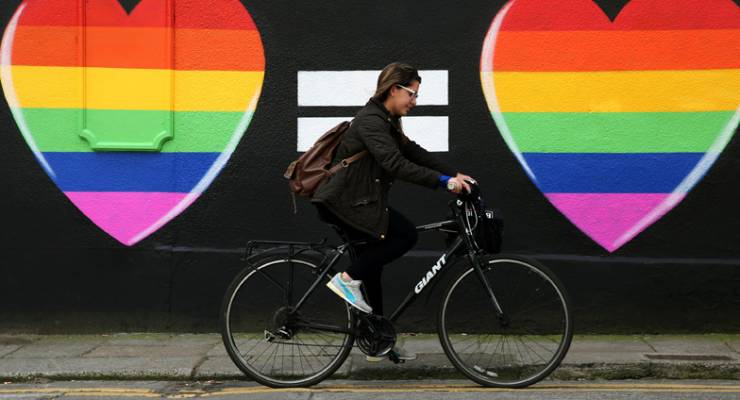
It’s up to those leading the “yes” and “no” arguments in the marriage equality debate to ensure it doesn’t get vitriolic, according to Australian Marriage Equality campaigner Tiernan Brady, who wants to bring the lessons he learnt from a successful Irish campaign to Australia.
Brady was the political director for the successful Yes Equality campaign in Ireland that resulted in the referendum vote approving marriage equality in Ireland last year. The success of the campaign has gained attention in other parts of the world where similar marriage equality campaigns are underway, including in Australia. Brady first visited Australia in February to meet with marriage equality campaigners and politicians, and he returned last month to begin working on the Australian Marriage Equality campaign in the lead-up to the election.
If Labor is elected on July 2, leader Bill Shorten has promised to introduce legislation for marriage equality into Parliament within 100 days. If the Coalition is elected, there will be a plebiscite some time after the election. The plebiscite would be a non-binding vote, with Parliament then needing to introduce and pass legislation to amend the Marriage Act. In his first interview with an Australian media outlet since returning to Australia, Brady tells Crikey that either way, AME will be ready.
“We have to be ready for whatever scenario it is. The most important thing from the marriage equality perspective is that whatever happens, we’re ready to win and do whatever we can to deliver victory.”
Brady maintains that a plebiscite isn’t required, but AME is prepared for the political reality of having to run a “yes” campaign. Brady says that the key to the Irish campaign was to make the argument about real people. In a rare moment of agreement, Brady echoes calls from the Australian Christian Lobby that any debate about marriage equality needs to be respectful.
“This can happen in so many countries where we’ve seen it become divisive, where it becomes more about angry debates on television rather than about the reality, which is conversations around dinner tables by people who are either lesbian or gay, or have friends who are lesbian or gay, or who are the parents of lesbian and gay people, or who are just supporters of equality. Those conversations are so important, we decided early on we had to create an atmosphere in Ireland where those conversations can happen. You can’t do that with anger, and you can’t do it by shouting at people.”
He says the Irish referendum result, and the way the result was received in Ireland — as a moment of shared joy — showed that this method of campaigning by changing people’s minds without being confrontational had been a success.
“Ultimately when you come to a campaign like this, we’re not here to defeat anybody; we’re here to persuade people. If you want to win someone over, you can’t call them names. Standing up on a chair and calling someone a homophobe is useless. It’s counterproductive.”
The role of the “yes” campaign, he says, will be to create a space where people who have concerns about same-sex marriage can ask questions and have their reservations addressed. This needs to be done on a grassroots level, empowering people in towns and cities to campaign on a local level, rather than just big advertisement campaigns.
“This is about getting people to see this campaign isn’t about some piece of law, it’s not about philosophy or religion, it’s about somebody standing right beside you. The people in those communities are the best people to be able to design what a campaign looks like in those communities. One little central office in Canberra, Melbourne, or Sydney can’t know what Australia looks like in every corner of it.”
The Australian Christian Lobby’s national conference over the weekend heard from several speakers who claimed they were being silenced for their opposition to same-sex marriage and made comparisons between the debate today and the Christian reaction to the rise of Adolf Hitler. This comparison has been strongly criticised, with ACL managing director Lyle Shelton being questioned about the claim on Q&A on Monday night. Brady says he doesn’t believe that Australia’s debate has become more vitriolic than anywhere else in the world, but he says both sides need to be wary of the language they use.
“There’s a truth in this that this is a vote about someone you know. It’s about a real person. Whether you’re on the yes side or the no side of this, words are incredibly important and how you choose to use them. The language we choose to use can have an impact on people … the rules we would like to consider all the time is the impact your words have on real Australians who are listening to this on the radio, seeing this on the television, reading this in the paper, or hearing it in their workplace.”
Australia goes into the campaign with a slim majority of current MPs and senators in favour of marriage equality, and both Bill Shorten and Malcolm Turnbull are in favour of the change, but Brady says it will still be a long journey.
“This is about making sure by the time whatever strategy is decided by the people in Parliament House, that we’ll be sitting here in a country where lesbian and gay people can get married. Would we like it yesterday? Yes we would, but we’ll be ready when we have the opportunity to make the decision.”








Crikey encourages robust conversations on our website. However, we’re a small team, so sometimes we have to reluctantly turn comments off due to legal risk. Thanks for your understanding and in the meantime, have a read of our moderation guidelines.